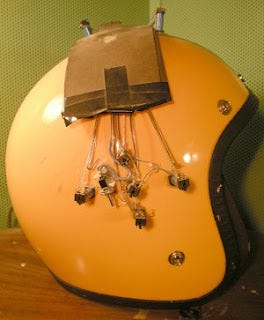In the 1990s, a Canadian research team built a helmet that could make you literally feel the presence of something else in the room.
The device was created from a snowmobile helmet wired with magnetic coils. It was designed to stimulate the brain’s temporal lobes: regions involved in memory, emotion, and our sense of self. When participants wore it in a darkened chamber, some described a presence nearby. Others wept. A few panicked. Some felt watched.
It came to be known as the God Helmet.
The God Helmet emerged from decades of research into altered states of consciousness, religious experience, and brain function. It was created by neuroscientist Michael Persinger, building on earlier work with Stanley Coren exploring the connection between temporal lobe activity and anomalous experience.
Their research suggested that subtle shifts or instabilities in the temporal lobes could be linked to phenomena like sensed presences, out-of-body experiences, and spiritual visions. The idea was that the brain itself might be wired to generate these kinds of experiences under certain conditions.
The helmet used weak, patterned magnetic fields applied to the sides of the head. These were far weaker than what you’d find in a medical device. They weren’t meant to shock the brain; they were meant to nudge it.
The Experiment
Participants sat alone in a dim, silent chamber. Their eyes were covered by a mask. On either armrest was a button. If they sensed a presence, someone looming to their left or right, they were instructed to press the corresponding button. If the presence loomed behind them, they were to press both.
Each subject wore a helmet outfitted with embedded solenoids, which emitted weak, patterned magnetic fields aimed at the temporal lobes.
Many of Persinger’s participants reported something strange: a sensed presence, a shift in body awareness, feelings of euphoria or dread. Some called it God. Some said it felt like a ghost. Others felt they were being watched closely by something or someone.
Independent replication attempts have yielded mixed results. For example, one research team ran a double-blind version of the experiment and found that the helmet didn’t predict somatosensory experiences, but that personality characteristics related to suggestibility did.
We Have God Helmets at Home
After the God Helmet experiments made headlines, one of Persinger’s




